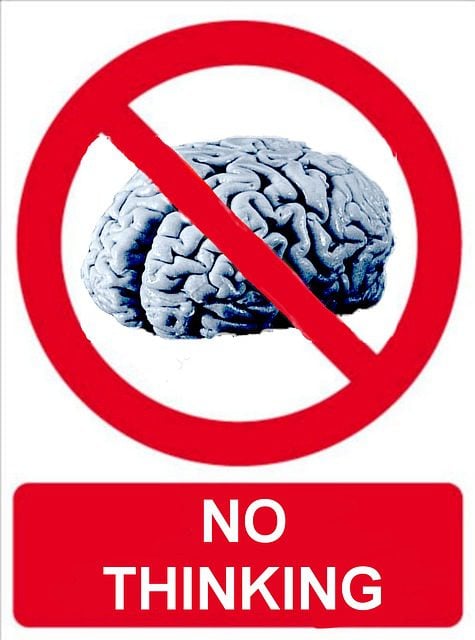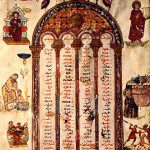[public domain / Pixabay]
This came about from my being made aware of the post, Neglected Factors in the Historical Adam and Eve Debate, by atheist Stewart James Felker. His words will be in blue. I cite some from the post itself and also a lot of his words in the combox.
* * * * *
Stewart makes an argument from the supposed profound unreliability of Scripture, and Genesis as allegedly not being able to be interpreted even partially as historical:
Today, though, we’re also in the position where virtually no serious scholar—and a great number of perhaps less “serious” ones, too—suggests that this narrative in Genesis was ever intended to be understood as referring to actual historical individuals. This is supported by centuries of work in comparative mythology, ethnology, etc., where non-literal (or, to use a more specific term, etiological) tales similar to the one that appears in Genesis 2-3 are more or less cultural universals. . . .
In this sense, this is much like our pseudepigraphical testamentary literature, which as we pointed out bears the tell-tale signs of pure fiction. In truth, it’s even more like a child’s fable; but at a certain point shouldn’t we leave behind childish things? . . .
Mythological ancestry and genealogizing was an important tool in the forging and legitimizing of ancient Greek identity, as well.
. . . the defenders of a historical Adam/Eve have, from the very beginning of their task, been dealt a serious opening blow, in that the likelihood of a historical Adam is already greatly diminished in light of the many similarities of this tradition to those of other (formerly) claimed primeval progenitors—figures whose actual historicity is universally denied, now that their champions are gone.
. . . to insist that a historical Adam and Eve—any Adam and Eve, no matter when or where—must have existed, only because it would be too theologically problematic to think otherwise, is no better than what young earth creationists do when they insist that what they believe must be true because the Bible cannot be false.
***
So do you contend that there couldn’t possibly be an Adam and Eve,
I mean, isn’t my post pretty clear as to where I come down on this? My last couple of paragraph explicitly address the issue of “possibility,” and why it’s such a weak basis for approaching this topic.
therefore, no original sin, therefore, salvation is unnecessary, and Christianity utterly collapses?
If I were a Christian, I would certainly come down on the “imitation, not propagation” side of things; but as I said, this is precisely what is not permitted in orthodoxy. (In other words, it was was neither my contention nor intention in my post to claim that; I’m merely working with what’s been dogmatically declared.)
That would be a rather ambitious claim. :-) But we’re used to such things from the same folks who commit intellectual suicide, in contending that Jesus or Paul didn’t exist at all.
You’re really going to equate denial of a historical Adam/Eve with Jesus Mythicism? (Something which, for the record, I’ve been publicly opposing for the better part of a decade.)
I’m delighted to hear that you oppose the “Jesus didn’t exist” silliness. That’s another reason why I think we could possibly have some very good and constructive discussions. I wouldn’t “equate” them; the denial of the historical Jesus is far stupider than a denial of Adam and Eve, since Jesus was a figure of only 2,000 years ago, and has a ton of historical evidence in His favor.
The folks who deny that He existed (many of your atheist buddies) use the same methodology you do: relentlessly questioning NT manuscript and textual evidence and making out that the NT can’t be trusted.
***
Anyone who is an orthodox Catholic believes that there was an Adam and Eve, from whom the human race derived (completely apart from the question of evolution and how they came to be).
I thought the context should be clear that here I’m talking specifically about Biblical scholars and the original literary intention of the Genesis narrative. While I’m aware of support for their existence on more theological/philosophical grounds (as well as from conservative Biblical scholars, which I acknowledged), this is so far outside the mainstream of Biblical scholarship as to be negligible.
So are you saying it is impossible to be a bona fide scholar and also an orthodox Catholic?
There are great Catholic Biblical scholars who have either explicitly or implicitly denied the historicity of the virgin birth (and other crucial elements of the birth narratives of Jesus), so I certainly don’t think it’s impossible for these to co-exist.
I have provided (in a related post) two Catholic philosophers who have made elaborate arguments about Adam and Eve; and also an Anglican philosopher.
I’m quite aware of these; but I thought it should be clear that my post is addressing other factors in these debates _other than_ those that the people you linked to focus on.
The Catholic view of Genesis is that it is a highly symbolic book that nevertheless also contains real historical figures. This has been expressly stated by, e.g., Pope Benedict XVI, who is a profound scholar and intellectual (as are many popes).
For the record I’m intimately familiar with the history of Catholic exegesis of Genesis. (I thought maybe my quotation of Augustine’s De Genesi ad Litteram and reference to the ecumenical councils, etc., might have suggested that, but…)
***
In short, in this post I used the debate over the presence of pseudepigrapha (forged writings) in the New Testament as a sort of jumping-off point for debate on the historicity of Adam and Eve, comparing the two — especially re: how our presuppositions shape the way we approach these things, and how some important preliminary considerations are often overlooked, which might change the shape of the debate altogether (or even nullify it).
I’m especially curious as to the Christian reaction this, and if these these considerations might inspire them/you to rethink the issue.
The gist of it seems to be the usual atheist hyper-condescending schtick: “[orthodox, historical] Christians R Dummies.”
Not a very charitable response.
I’m simply responding to your claim:
“. . . virtually no serious scholar—and a great number of perhaps less “serious” ones, too—suggests that this narrative in Genesis was ever intended to be understood as referring to actual historical individuals.”
It follows that anyone who believes in historic Christianity (Catholic / Orthodox / Protestant), which includes the tenets of an historical Adam and Eve and original sin in some sense (Nicene / Chalcedonian Christians differ on details of original sin) cannot possibly be a serious scholar.
Everything has wide-ranging implications, to be sure; but what follows, first and foremost, is that there’s negligible academic support for this particular issue. I take it that the fact of the existence of this academic consensus is verifiable, or at least falsifiable.
That reduces to my sarcastic but accurate description: “Christians R Dummies.”
That’s not a way to invite discussion with us, if to come to the table of adult conversation we have to admit that we are either imbeciles, or immediately ditch beliefs that are fundamental to Christianity: without which there could be no Christianity at all.
Therefore, our choice is to either admit our profound stupidity and anti-intellectual, ignoramus status (i.e., if we manage to maintain our [orthodox / historic] Christian beliefs in the face of your onslaught), or cease being Christians, so we can be with the cool, smart people, and be respected and welcomed by same.
Some choice, huh?
Contrast this (it’s like night and day) with my irenic attitude towards atheists, expressed in a recent post:
“I don’t regard atheists as wicked or liars or “insane” simply because they are atheists. I see it as a flaw in thinking: the sincere acceptance of wrong premises and falsehoods. I have a post up where I say that atheists can quite possibly be saved (as atheists). . . . I don’t think atheists are stupid. They are usually quite intelligent and rational. . . . I am quite prepared to respect and treat with kindness any atheist who can carry on a normal conversation.”
I would think that your first option here would actually be to actually engage with some of the more specific arguments I’ve raised here — e.g. the validity of the comparison between the issue of pseudepigrapha and the historicity of Adam, etc. Of course, at a certain point I suppose such an engagement will have to get into the more pedantic issues of these debates; but thus far we haven’t even made a step in that direction.
For constructive debate to occur (and for me to devote significant time to something), there has to be a minimal amount of mutual respect. This is my point. I haven’t even gotten to the other yet, because these presuppositional issues have to be determined.
If I was somewhat sarcastic or condescending in a couple of places in my post, so what? Some of the greatest defenders of Christianity (like David B. Hart) are horribly condescending. That doesn’t mean I ignore their arguments.
Like 97% of my post was substantive analysis, and maybe 3% off-hand sarcasm or whatever. To focus on the latter while ignoring the former looks like purposeful avoidance.
I wasn’t objecting to sarcasm (didn’t even notice it), but to premises quite hostile to traditional Christianity.
We all choose what battles are worth fighting. You may call that “avoidance”. It is in a sense, but I would call it “sensible time-management.”
If your starting presupposition is that to believe in the historical Adam and Eve is to throw away one’s mind and descend to the level of the detested young earth creationists, I don’t see that we have much to talk about.
But if you modify or qualify your extreme premises, then maybe we could constructively interact.
I think if you read my last sentences/paragraph more carefully, you’ll see that what I said was much much narrowly formulated: “to insist that a historical Adam and Eve—any Adam and Eve, no matter when or where—must have existed, only because it would be too theologically problematic to think otherwise…”
If the doctrine of a historical Adam and Eve genuinely was so important for orthodoxy, why did tradition not see fit to pass down any details that might have helped us more precisely locate them in history? (Of course, tradition pretty unanimously passed down the idea that they lived about 6,000 years ago or so; but I’m giving then a pass on that one.)
But because they didn’t, modern defenders basically depend on the gaps in our knowledge of early anthropology, and insert Adam and Eve wherever and whenever they can here.
But this is all purely hypothetical; and in that sense how is this any different from the hypothetical possibility of a historical <insert other=”” mythical=”” progenitor=””> somewhere in history?
I don’t see any recognition there that those of us who believe in the historical Adam and Eve have our intellectual “credentials” (so to speak) still intact.
Yes, I did indeed write of “truly mature and intellectually honest investigation,” in a way that somewhat implied that some people do _not_ seem to approach the issue(s) this way.
But on the other hand, I think some of the other things I said should be more narrowly construed, too. For instance, there’s a difference between, say, “very few serious scholars could believe [something]” and “very few serious scholars do believe [something].”
Regardless of whether I think there could even be any legitimate case for a historical Adam/Eve, the latter sentence (“very few serious scholars do believe [something]”) is simply an observation about the way things are.
Yes, based on the facts that 1) Catholics believe in a literal Adam and 2) Catholics are involved in academia, we should expect that at least some scholars defend a literal Adam. But I’ve already reiterated that there are many mansions in academia, and a lot of the defenders seem to come from the theological/philosophical side — and that the number of scholars who are looking directly at “the original literary intention of the Genesis narrative” and concluding that it’s talking about a literal Adam/Eve is virtually non-existent.
(I suppose the counter-argument to this is going to be that Tradition does inspired exegesis that goes beyond the “original intention.” That would be a whole other conversation; but I don’t think we should underestimate the extent to which a literal Adam/Eve is pretty much wholly grounded in interpretation of the Genesis narrative.)
If indeed Adam and Eve existed 6,000 years ago (as many have thought the biblical genealogies suggest or even establish), neither a young earth nor a denial of evolutionary precursors are necessary.
It’s mainly, I think, because of a false suspicion that an Adam and Eve in that time period would necessitate a young earth or denial of evolution, that the 6,000 years-old status is ridiculed as anti-intellectual, “anti-scientific,” etc. Since the suspicions in this case are wrong, the conclusions don’t follow from them. They only apply to those who are young earth creationists on other grounds.
I think most scientists/anthropologists/etc. dismiss a 6,000 year old Adam and Eve (as the couple who genetically passed on the stain of sin to every living human — which is what my original post was concerned with, after all) because basically every corner of the earth was already populated long before 6,000 years ago, such that there could not have been a single couple 6,000 years ago who were common ancestors to all.
The last paragraph illustrates one of my points. The theistic evolutionary acceptance of an Adam and Eve isn’t saying that they were literally the first two human (or human-like / hominid) beings: however long ago scientists now believe such creatures existed.
Adam and Eve, in Christian belief, were the first two hominids who had a soul: which we believe is a supernatural creation by God; and were made in the image of God (questions beyond the purview of materialistic science and not permitted in it). Therefore, there could have been creatures prior to them, not in possession of a soul, and hence not “human beings” in the full Christian sense.
The philosophers Kemp and (I believe) Feser delve into this, but you don’t want to deal with that and dismissed it as irrelevant to this discussion.
It’s not, because it shows that evolution and genetics as currently conceived, is not necessarily fatal to the traditional Adam and Eve and the notion of a primal pair.
They argue this stuff (as professional philosophers) far better than I do. I’m simply noting, in my job as an apologist, that there are such analyses out there.
***
I don’t see how my observations were off-base. You are indeed questioning the basis for the historical Adam and Eve, and contending that no “serious scholar” could possibly believe in their existence.
You seem to be walking that back a bit now; perhaps acknowledging in a roundabout way that your claims were too ambitious and sweeping.
Pope Benedict XVI / Joseph Ratzinger is not a serious scholar because he believes in Adam and Eve and original sin (as all orthodox Catholics and Orthodox and Protestants do). Really? He wrote in 1986:
In the Genesis story . . . Sin is not spoken of in general as an abstract possibility but as a deed, as the sin of a particular person, Adam, who stands at the origin of humankind and with whom the history of sin begins. The account tells us that sin begets sin, and that therefore all the sins of history are interlinked.
(“In the Beginning…” A Catholic Understanding of the Story of Creation and the Fall, translated by Boniface Ramsey, O.P., Huntington, Indiana: Our Sunday Visitor, 89)
This is the typical outlook of atheists: the only Christians who have serious intellectual credentials at all must be the “liberal” or self-described “progressive” ones, who ditch biblical inspiration (or accept it only arbitrarily and selectively) and various traditional Christian beliefs, supposedly because modern science or philosophy “require” it.
Yes, there are plenty of liberal / modernist Catholic scholars who are no longer orthodox Catholic. Believe me, I’m well aware of that, as an apologist for the Catholic faith.
If you would ratchet down the rhetoric so the likes of me could participate in the conversation without automatically being classified as an ignoramus, by your own criteria, I think we might be able to have some good conversations.
In order for that to happen, I had to go right to your premises (as I always do; being a socratic debater) and reveal the logical reductions of them and how they look to orthodox Christians such as myself.
I don’t spend time trying to dialogue with people who think I can’t possibly have a head on my shoulders while accepting orthodox Catholicism in its entirety.
Related reading:
Fr. Robert Barron Denies that Adam Was a “Literal Figure” [9-23-11]
Adam and Eve, Cain, Abel, and Noah as Historical Figures (Biblical Data and Catholic Agreement) [2-20-08]
Adam & Eve & Original Sin: Disproven by Science? [9-7-15]
Defending the Literal, Historical Adam of the Genesis Account (vs. Catholic Eric S. Giunta) [9-25-11]














